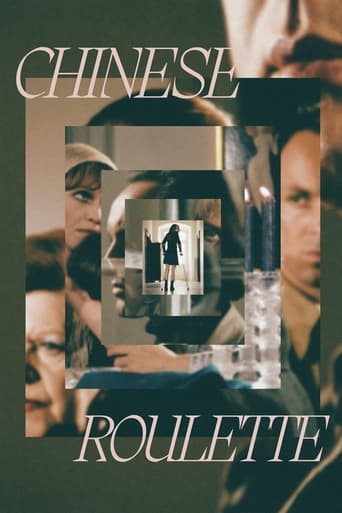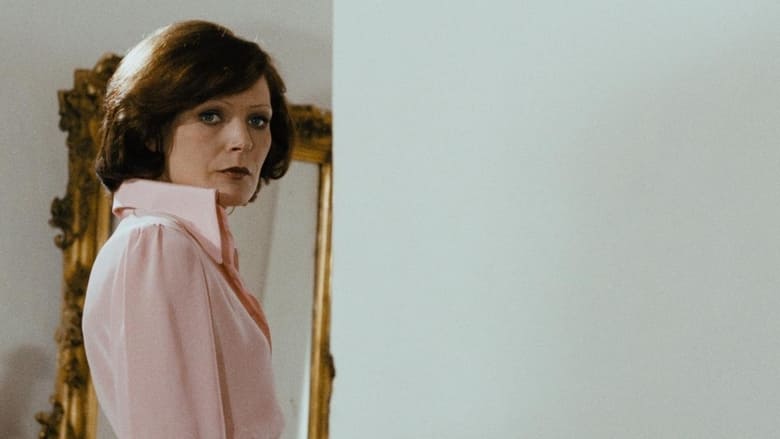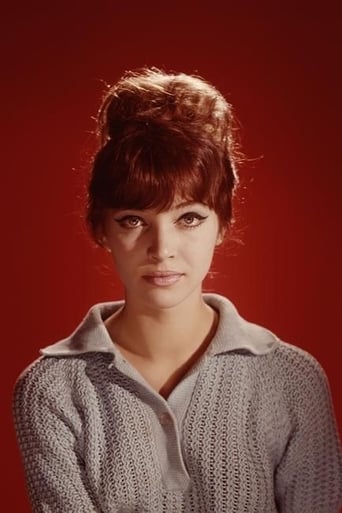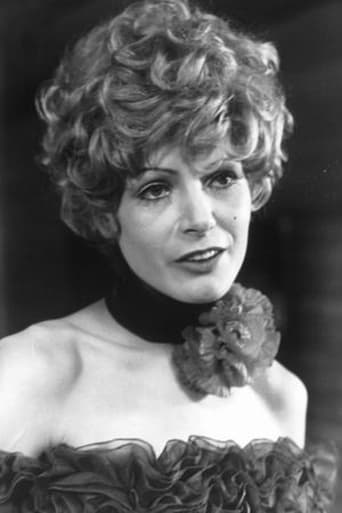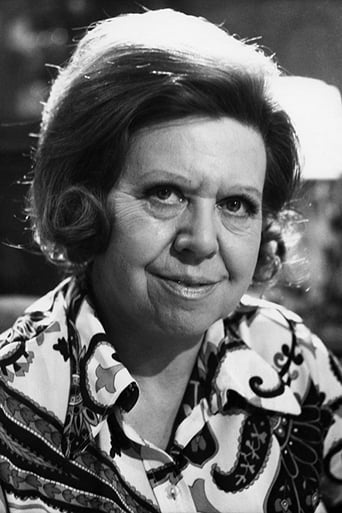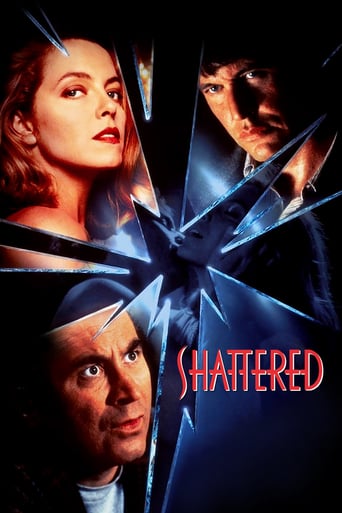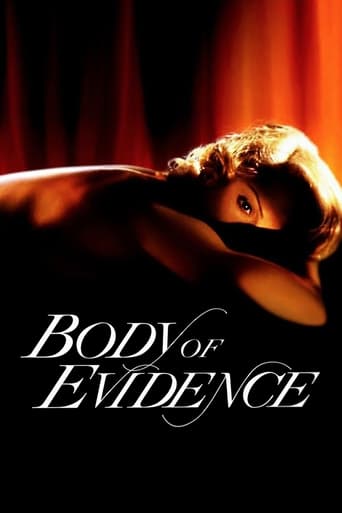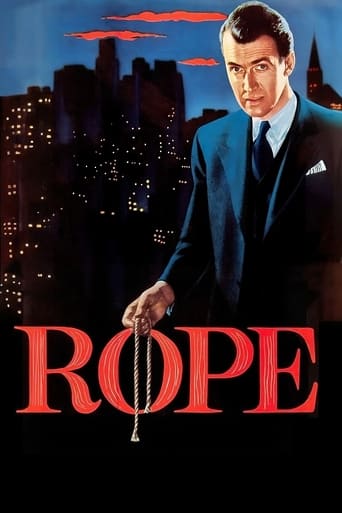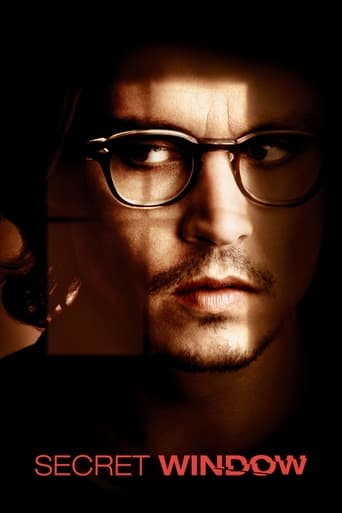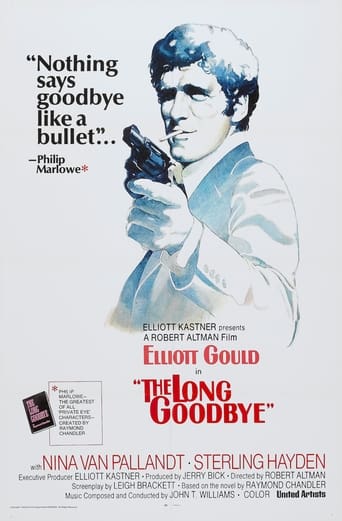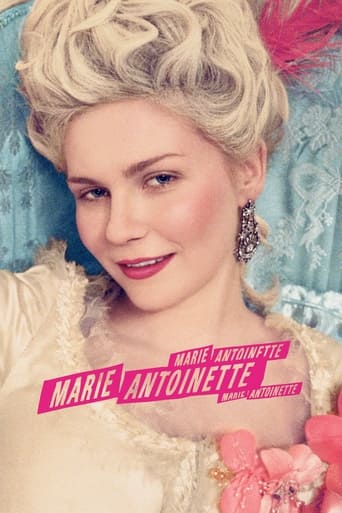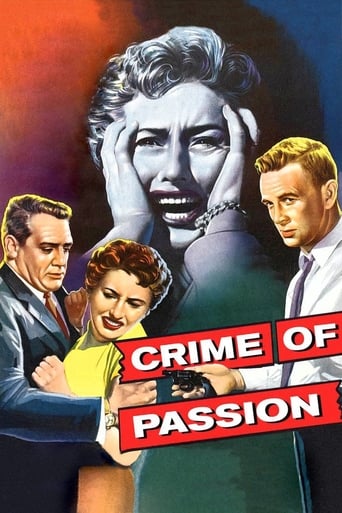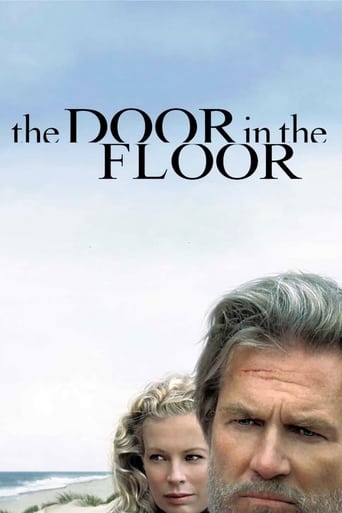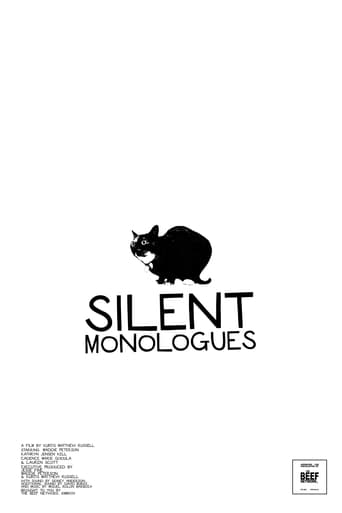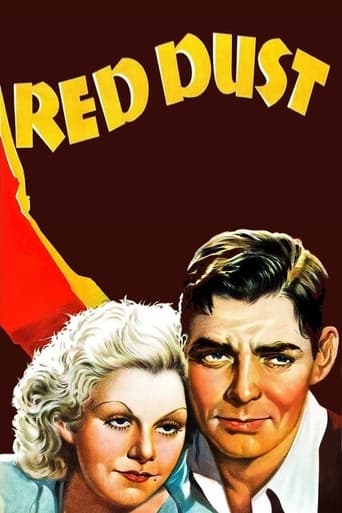Chinese Roulette (1977)
A husband and wife lie to each other about their weekend travel plans, only to both show up at the family's country house with their lovers.
Watch Trailer
Free Trial Channels
Cast


Similar titles
Reviews
It's not great by any means, but it's a pretty good movie that didn't leave me filled with regret for investing time in it.
an ambitious but ultimately ineffective debut endeavor.
It’s sentimental, ridiculously long and only occasionally funny
The thing I enjoyed most about the film is the fact that it doesn't shy away from being a super-sized-cliche;
The scenario is promising: a manipulative crippled daughter, estranged parents and their new lovers, the promise of a game of Chinese roulette, potentially sinister or magical caretakers of a mansion... There were so many interesting things that might have happened... Perhaps with a mid-script overhaul this could have been a cool horror movie.But the finished product is a lot of sound and fury signifying nothing. The cast are like a bunch of stilted marionettes staring at each other, saying abstract things. People behave like directionless props; there's no tension or drama, and nobody cares. I believe there may have been some kind of master plan at work here, but something got sucked out of it between concept and page and the whole thing is just empty and pointless.A movie with great potential, but it needed about 12 more rewrites than Fassbinder gave it.
A R.W. Fassbinder double-feature binge (Chinese ROULETTE 1976 and QUERELLE 1982, his swan song) coincides with a starting point for me to access his oeuvre, as one of the pioneer of modern German cinema, Fassbinder has a burning-too-fast career orbit, as if he was exerting all his energy in cranking out films before his dooming self-indulgent suicide at the age of 37 (with more than 40 works done in 15 years). Yet two films must have its restricted view, but Fassbinder films' mindset nevertheless more or less could be conjectured from them, and his stylish flourish is also mesmerizingly toxic. Both films could adopt themselves comfortably into a theatrical play not the least courtesy of their (mostly or exclusively) in-door locales, for Chinese ROULETTE, it has a secular tone, 90% of the film takes place inside a rural mansion, with familial secrets, connubial deceptions, mother-daughter hatred, the divide of social strata, vindictive self-destruction viciously unfold and infuse a deleterious corruption even to the onlookers, all is triggered by the innocuous eponymous game. While QUERELLE is projected on more ritualized dark amber light sepia background setting stimulating a claustrophobic oppression of lust and desire within a handful locations (the faux-deck of a ship ashore, the phallus worship Hotel Feria Bar, an underground tunnel for hideaway), a male-dominant sexual obsession mingled with blatant homosexual thrust to an astounding incestuous extremity, brilliantly done via an intuitive candor. Mirror is a recurrent item in both films, exposes the other-half which reflects the true id inside one's soul, in Chinese ROULETTE the stunning flux of the stationary tableaux interlacing two or three out of the eight characters orchestrates a scintillating picture of a guilt-and-punishment visual symphony with swishy panache; in QUERELLE, mirrors reduce their occurrence but the conscientiously measured compositions transpire an even more ostentatious narcissism with a sultry plume of hormone-excreting rugged contours of male bodies. QUERELLE is adapted from Jean Genet's novel "QUERELLE DE BREST", whose literature text also introduced through the soothing voice-over of an unknown narrator, the film does stage a sensible amount of poetic license to filter a vicarious compassion through a singular mortal's inscrutable behavioral symptoms; in Chinese ROULETTE, a prose (or poem) soliloquy of androgyny also contrives to reach the same effect (but sounds a trifle recondite when contextualizing it under the film's incumbent situation). Anyhow Fassbinder is a trailblazer in defying the mainstream's prejudices, and very capable of visualize and dissect the tumor of humanity. The cast, there are 8 characters in Chinese ROULETTE, with almost equal weight in the screen time, but it is the youngest one, Andrea Schober (under Fassbinder's guidance for sure), the crippled girl seeks for revenge to her parents' betrayal and negligence, teaches all of us a lesson (how selfish we are to find a scapegoat for every bit of repercussions happen to us) with such acute insight, fearless audacity and extreme measures. While big name (Anna Karina) and other Fassbinder's regulars (Margit Carstensen, Brigitte Mira, Ulli Lommel) all end up licking their own wounds in the corner. In QUERELLE, Brad Davis (a real-life AIDS fighter then) is valiant, his masculinity and sinewy physique defies all the stereotyped treatment of gay men in the media, injecting a raw and visceral complexity into Querelle's spontaneous promiscuity and sporadic anger. Hanno Pöschl may fall short to guarantee the vigorous duality required for his two roles, but the gut- bashing combats (or playing) between two brothers fabricate the most erotic intimacy has ever been presented on the screen. Two veterans, Franco Nero is either recording his secret affection in the cabinet or wandering near Querelle from oblique angles; the fading beauty Jeanne Moreau, hums "Each man kills the things he loves", and is lost in her own fantasy of the banquet she can savor. Personally I incline towards QUERELLE's unconventional approach to kill off the ambiguities of sexual orientation and examine the most primal desire made with blood and flesh, but Chinese ROULETTE achieves another form of success, it maintains a serene aplomb above all the vile assault and bitter turbulence, like the unspecified pistol shot at the coda, no matter who bites the dust, a bullet is never an ultimate solution to all the problems.
"Chinese Roulette", directed by R.W. Fassbinder (1976), is kind of a minimalist work, and, as it turns out, the quite right surrounding for a very special form of social terrorism as executed by a child.Also simple is the structure of the characters - and the more impressive, when you see during the movie which Eigen-dynamics it discloses: Gerhard Christ and his wife Ariane have a marriage that is founded on money. He has a girlfriend - the Parisian Irene, she has a boyfriend - the husband's collaborator Kolbe. But these are not the only couples in the movie: There is also mother Kast and son, Gabriel. And then there is an informal couple, Gerhard and Arianes daughter Angela and her nurse Traunitz. (Watch the names: Christ, Ariane vs. Irene, Gabriel, Angela. Who is the devil? The arch-angel Gabriel's mother or daughter Angela "the angel"?).Since everybody lied on everybody telling one another that they are going to Oslo, Milano and to the Zoo, they all meet quite unexpectedly in the family-castle. Now, everybody is unable to have his privacy with his respective boy- and girlfriend. So, one drinks and is bored until the handicapped daughter Angela desires to play "Chinese Roulette" (a play that has been invented by R.W. Fassbinder as a verbal analogy to Russian Roulette). Fassbinder said concerning this movie in an interview in my translation: "I think that relationships between humans are largely defined by conflicts. If I sit at my desk and just write something down without reflecting much, then there will probably be written more about conflicts than about attentions between humans".
Like most Fassbinder films, it's seemingly simple, but there's a lot too it when you walk a bit closer. This one sets up a great tragicomic situation: a disabled teenager manipulates her parents each to bring their lover to their summer mansion for the weekend. When the father arrives with his lover (Anna Karina, in a very quiet role), he finds his wife pinned to the floor by her boy toy. A bit later the daughter arrives with her caretaker (and possibly her lover?) who is deaf and mute. Mrs. Kast and her blonde son, Gabriel, take care of the mansion, cook, and so forth. Kast is played by Brigitte Mira, who was so wonderful two years earlier in Fassbinder's Fear Eats the Soul. She's a lot more cruel in this one.With the situation as it is, their true characters quickly rise to the surface. The parents get the most time; father is loving in his way, but his love is probably only a result of the guilty feelings he has towards his daughter. Mother, on the other hand, is quite the psycho. At one point, as she sees her daughter lumbering along on her crutches from a second story window, she picks up a pistol and aims it at her daughter's back. She uses no euphemisms: her daughter, she believes, has ruined her life. Fassbinder's direction is exquisite. His framing is so complex, but it's invented to look simple. The simple set might be called stagey by those who are not paying enough attention. When the four lovers meet, Fassbinder circles the camera around them as they pace around each other, creating a dizzying dance. Peer Raben's gorgeous and unique music also should be pointed out.Not everything works out perfectly. The titular game is an interesting idea to do on film. The eight characters split into two groups, the first picks a person in the house and the second has to guess after they've asked a certain number of questions. I think Fassbinder has a difficult time making the questions and answers meaningful for the film as a whole. These exchanges get a little ponderous as a result, and the only thing that keeps the sequence alive is Raben's score. Like I said, it was quite a daring thing to do, so the fact that it doesn't work out perfectly doesn't harm the film too much. 9/10.

